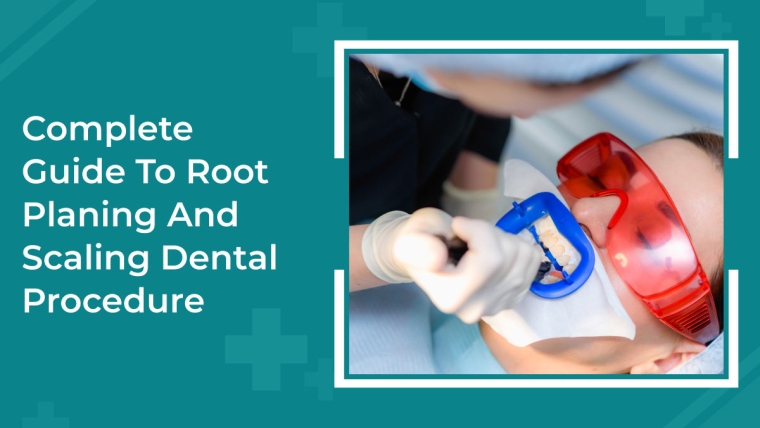Written by: Dr Ekta Khatri – Co- founder, The Func Dent – The Functional Dentistry Center, Bandra
A variety of factors contribute to our overall health, including diet, exercise, and lifestyle. Among these, diet plays a crucial role. However, challenges such as missing teeth, whether due to age-related tooth loss or other reasons, can make it difficult to maintain a balanced diet. These issues can lead to problems with proper chewing and improper breakdown of food, ultimately affecting digestion and nutritional intake. In such cases, a dental implant can be an effective solution to replace the missing tooth and restore proper function.
In this blog, we will explore what dental implants are, who is a good candidate, their benefits, the procedure, and more.
A] What Are Dental Implants?
When a natural tooth is lost for any reason, dental implants are the preferred advanced treatment. This option closely mimics natural teeth in both appearance and function. Below are the three main components that make up an implant:
- Implant: A titanium post that acts as an artificial root and is surgically placed into the jawbone.
- Abutment: The connecting piece that attaches to the implant post.
- Crown: The artificial tooth that sits on the abutment and completes the tooth replacement.
B] Who Is a Good Fit for Dental Implants?
A dental evaluation is important to assess oral health and bone density. The following are some of the key criteria:
- Oral Health: Healthy gums and sufficient jawbone density are essential to support the implant.
- Oral Hygiene: Candidates who maintain good oral hygiene practices can reduce bacterial buildup and increase the chances of successful dental implant placement.
- Lifestyle and Habits: People with healthy habits, particularly non-smokers or those who do not consume excessive alcohol, have a greater chance of experiencing a successful outcome.
- Overall Health: Individuals without chronic illness, such as diabetes or immune disorders, as these conditions can affect healing and recovery.
C] Benefits of Dental Implants
There are numerous advantages of dental implants that go beyond just replacing a missing tooth. Below are some of the most significant benefits:
- Natural Look and Feel: The implant is designed to blend seamlessly with the existing teeth, which is one of the appealing benefits of dental implants. Also, because it is anchored into the bone, it functions and appears just like a real tooth while speaking, eating, or smiling.
- Improved Confidence and Self-Esteem: Dental implants have a notable impact on reducing self-consciousness or embarrassment, especially in personal interactions. They are also valuable in a professional setting, allowing you to smile and engage confidently without the worry of how you look or if the prosthetic (like dentures) might shift.
- Improved Speech and Chewing: Dental implants stay firmly in their place, and this stability helps to maintain clear and natural speech. Chewing is also greatly improved with implants compared to dentures, which can slip or move, causing mumbled speech or difficulty in eating certain foods. Hard and chewy foods can be enjoyed in full biting power, allowing you to enjoy a varied diet without limitations.
- Better Nutrition and Digestion: As implants enhance your ability to chew a wide range of foods comfortably, you can freely enjoy fibrous fruits, nuts, and lean proteins, all of which are essential for health. With proper chewing, digestion is also improved, contributing to overall gastrointestinal well-being.
- Improved Oral Health: The natural tooth structure is preserved with dental implants, unlike traditional bridges, which involve grinding down the adjacent healthy teeth to anchor the prosthetic. Since implants maintain proper alignment and spacing, oral health risks, including tooth decay and gum disease, are greatly reduced.
- Bone Preservation: This is among the few tooth replacement options that significantly support facial structure and bone health. When a tooth is lost, the specific area of jawbone begins to deteriorate due to lack of stimulation. This can lead to a sunken facial appearance and reduced structural integrity of the jaw. Dental implants prevent this by serving as a substitute for the tooth root, which stimulates the bone and preserves its density.
- Long-Term Durability: With proper care, dental implants can remain functional for decades. The titanium post is highly resistant to corrosion and decay, and the prosthetic crown is made from durable materials that can withstand daily wear and tear. Implants require minimal maintenance, just regular brushing, flossing, and routine dental checkups, making them a long-lasting solution that rarely needs repair.
D] The Dental Implant Process
- Initial Consultation & Imaging: The process of dental implants begins with an initial consultation and imaging, during which the overall oral health and bone density are evaluated by the dentist. 3D scans or digital X-rays are used to plan the precise placement of the implant.
- Implant Placement: The next stage is the implant placement phase, involving a minor surgical procedure. During the surgery, a titanium post is positioned into the jawbone, which acts as an artificial tooth root. Generally, local anaesthesia is used, and most patients experience minimal discomfort.
- Healing Period (osseointegration): After the placement, the healing period begins, also known as osseointegration. During this stage, the implant fuses with the surrounding bone, forming a stable foundation for the tooth restoration.
- Abutment & Crown Placement: After healing is complete, the abutment and crown are placed. The abutment connects the implant to the crown, which is carefully crafted to match the shape and colour of the patient’s natural teeth. After final placement, the dental implant restores the comfort, appearance, and function of natural teeth.
E] Maintenance Required for Dental Implants
- Maintain Excellent Oral Hygiene: Dental implants require the same level of attention and care as our natural teeth. This includes practising good oral hygiene habits such as brushing twice daily with a soft-bristle toothbrush and flossing regularly. Using an antimicrobial mouthwash if recommended by the dentist to maintain gum health. All these are essential for maintaining the long-term success of the implant and oral health.
- Healthy Diet for Gum and Bone Health: A balanced diet plays a crucial role in supporting your oral health. Foods rich in calcium, vitamin D, and other essential nutrients help in maintaining both gum health and bone density. Sugary and acidic foods should be avoided, as they can contribute to bacterial buildup and inflammation.
You can read more about how certain beverages affect your dental health to better understand their impact over time. - Quit Smoking (if applicable): Habits such as smoking affect the blood flow to the gums, which is why patients are strongly advised to quit. The impact of smoking also includes impaired healing and contributes to the failure of dental implants.
- Regular Dental Check-Ups: For early detection of potential issues, it is important to visit your dentist every 6 months or as advised to monitor the health of the implant. These check-ups are a critical part of maintaining both your general dental care and implants over time.
Considering dental implants and unsure if it is a right decision?
Book your appointment today and take the first step toward better oral health!
Conclusion
Dental implant treatment is a reliable and long-lasting solution offering multiple benefits. Along with serving their primary purpose of replacing missing teeth, they significantly contribute by improving function, aesthetics, and overall oral health. From the initial consultation to the long-term maintenance, each step of the process is designed to deliver confidence, comfort, and durability. With proper care, including maintaining good oral hygiene, regular dental visits, and healthy habits, implants can last for decades.
Have you lost one or more teeth and are looking for a long-term solution? Contact The Func Dent, a trusted dental clinic in Bandra. Their approach combines an in-depth understanding of dental issues with personalised treatment plans. For expert care and dental implants tailored to your needs, get in touch with them to explore effective solutions that support your long-term oral health.




